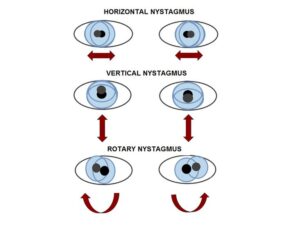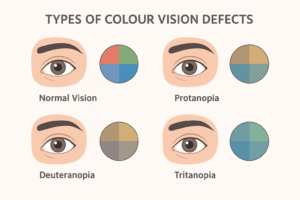
Anushka Super Speciality Eye Hospital
Call: 90044 44422 / 99213 44422 | Timings : 8.30 a.m to 5.30 p.m (Mon-Sat) | Add: Shri Swami Samarth Soc, Kaneri Dhamankar Naka, Bhiwandi




Accredited for Quality Care
Glaucoma: Complete Guide to Causes, Symptoms, Types, Treatment, and Complications
anushka
19 August 2025
Introduction to Glaucoma
Glaucoma is not a single disease but a group of eye conditions that damage the optic nerve, which connects the eye to the brain. The damage is often linked to high intraocular pressure (IOP)—but it can also occur with normal eye pressure.
Known as the “silent thief of sight”, glaucoma often develops without noticeable symptoms until significant vision loss has occurred. According to the World Health Organization (WHO), glaucoma is one of the leading causes of irreversible blindness worldwide.
The good news? Early diagnosis and timely treatment can prevent or slow vision loss.
What Causes Glaucoma?
The eye constantly produces a clear fluid called aqueous humor. This fluid flows through a drainage system and exits through the angle where the iris and cornea meet. If this drainage system is blocked or works inefficiently, the fluid builds up, increasing intraocular pressure and damaging the optic nerve.
Main Causes:
- Blocked drainage channels
- Overproduction of aqueous humor
- Poor blood supply to the optic nerve
- Eye injury or trauma
- Secondary effects of other eye diseases
Risk Factors for Glaucoma
You are at a higher risk of developing glaucoma if you have:
- Age over 40 years
- Family history of glaucoma
- Thin corneas
- High myopia (short-sightedness)
- Medical conditions such as diabetes or hypertension
- Previous eye surgery or injury
- Prolonged steroid use (eye drops, oral medication, or inhalers)
Signs and Symptoms of Glaucoma
Symptoms vary depending on the type and stage of glaucoma.
Open-Angle Glaucoma (Most Common)
- Gradual loss of peripheral vision
- Tunnel vision in later stages
- Often no pain or early warning signs
Angle-Closure Glaucoma (Eye Emergency)
- Sudden severe eye pain
- Headache and nausea
- Blurred vision and halos around lights
- Red eye
- Rapid vision loss
Normal-Tension Glaucoma
- Vision loss despite normal eye pressure
- Often detected during routine eye exams
Congenital Glaucoma (In Infants)
- Cloudy or enlarged eyes
- Excessive tearing
- Light sensitivity
Types of Glaucoma
1. Primary Open-Angle Glaucoma (POAG)
- Most common type
- Develops slowly over years
- Caused by gradual clogging of drainage canals
2. Angle-Closure Glaucoma
- Less common but more severe
- Caused by sudden blockage of fluid drainage
- Requires immediate treatment to prevent blindness
3. Normal-Tension Glaucoma
- Optic nerve damage occurs at normal eye pressure
- Linked to poor blood flow or sensitive optic nerves
4. Congenital Glaucoma
- Present at birth due to abnormal development of the eye’s drainage system
5. Secondary Glaucoma
- Caused by other medical conditions or eye injuries
Includes neovascular glaucoma (due to abnormal blood vessels) and pigmentary glaucoma (due to pigment deposits)
How is Glaucoma Diagnosed?
A comprehensive eye exam is essential. Tests include:
- Tonometry – measures eye pressure
- Ophthalmoscopy – checks optic nerve health
- Perimetry – tests visual field
- Gonioscopy – examines drainage angle
- Pachymetry – measures corneal thickness
Pro tip: People over 40 should get an eye exam every 1–2 years, even without symptoms.
Treatment Options for Glaucoma
The goal of treatment is to lower eye pressure to prevent optic nerve damage. While glaucoma cannot be cured, it can be controlled.
1. Medications
- Eye drops (first-line treatment)
- Prostaglandin analogs (Latanoprost, Bimatoprost) – increase fluid outflow
- Beta-blockers (Timolol) – reduce fluid production
- Alpha agonists (Brimonidine) – decrease fluid and increase drainage
- Carbonic anhydrase inhibitors (Dorzolamide) – reduce fluid production
- Oral medications
- Acetazolamide – used when eye drops are insufficient
2. Laser Therapy
- Laser Trabeculoplasty – opens drainage canals for open-angle glaucoma
- Laser Iridotomy – creates a hole in the iris for angle-closure glaucoma
- Cyclophotocoagulation – reduces fluid production
3. Surgical Treatment
- Trabeculectomy – creates a new drainage channel
- Drainage implants – helps fluid leave the eye
- Minimally Invasive Glaucoma Surgery (MIGS) – smaller incisions, faster recovery
- Eye drops (first-line treatment)
Possible Complications of Glaucoma
If untreated, glaucoma can lead to:
- Permanent vision loss
- Blindness
- Reduced quality of life
- Falls and injuries from poor vision
- Emotional distress and depression
Living with Glaucoma
While you can’t reverse damage, you can protect your remaining vision:
- Take prescribed medications regularly
- Keep up with follow-up visits
- Maintain a healthy diet rich in leafy greens, fish, and antioxidants
- Wear eye protection during risky activities
Prevention and Early Detection
You can’t always prevent glaucoma, but you can reduce your risk:
- Regular eye exams
- Control diabetes, blood pressure, and cholesterol
- Avoid self-medicating with steroid eye drops
- Protect eyes from injury
Frequently Asked Questions (FAQ)
Q1. Can glaucoma be cured?
No. It can be managed with medication, laser, or surgery to prevent further damage.
Q2. Does glaucoma always cause high eye pressure?
Not always—normal-tension glaucoma occurs with normal pressure.
Q3. Who should be screened for glaucoma?
Anyone over 40, those with family history, and people with diabetes or myopia.
Q4. Can children get glaucoma?
Yes—congenital glaucoma can occur in infants.
Q5. Is glaucoma painful?
Most types are painless, except for acute angle-closure glaucoma, which causes severe pain.
Q6. Can lifestyle changes help?
Yes—healthy diet, exercise, and avoiding eye injuries can support overall eye health.
Q7. What happens if I stop my glaucoma medication?
Eye pressure can rise quickly, leading to rapid vision loss.
Conclusion
Glaucoma is a serious, lifelong eye disease that can cause irreversible blindness if left untreated. Because it often develops without symptoms, regular eye check-ups are the best defense.
With early diagnosis, proper treatment, and lifestyle care, people with glaucoma can lead normal lives and protect their vision for years.
Recent Posts


